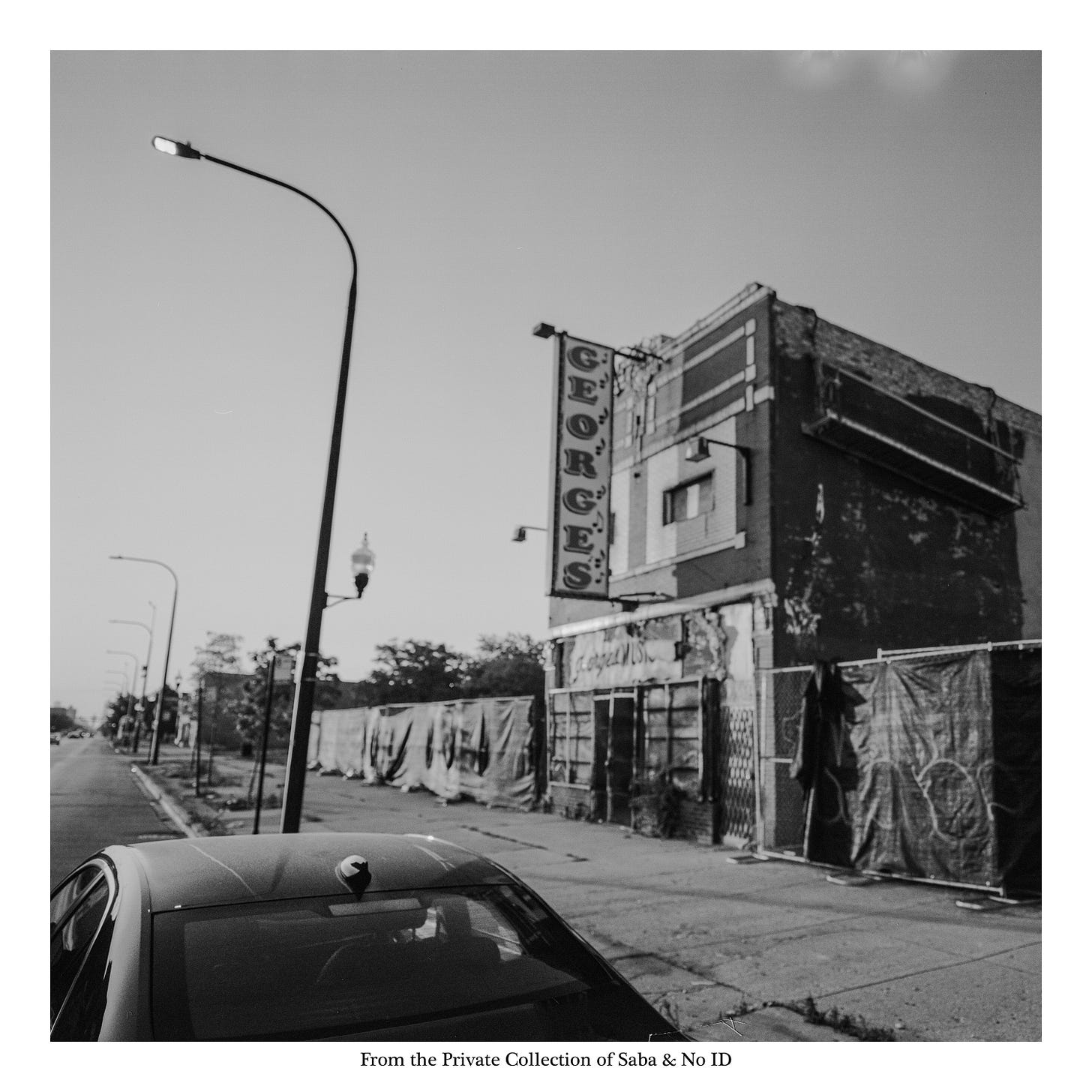Album Review: From the Private Collection of Saba and No ID by Saba & No ID
Saba uses the mic to share pieces from his “private collection” of thoughts and experiences, while No ID has crafted a sonic environment, from mellow reflective beats to harder, triumphant anthems.
Chicago rapper Saba and veteran producer No ID have spent years crafting this joint album, forming a partnership built on mutual respect and learning. Saba’s first studio session with No ID left a strong impression—he recalls it being “memorable as fuck,” noting that No ID “made 20 beats in one sitting… gave me 20 beats, and then went home,” showcasing the producer’s legendary work ethic. Despite being 23 years older than Saba, No ID brings a playful, youthful energy to the studio, while Saba tends to be more quietly focused. In a promotional video, Saba even portrays himself as a perfectionist fussing over details while No ID stays calm and confident—at one point, Saba jokes, “He ain’t got a worry in the world… [he’s] really nice like that, huh?” before No ID reassures him, “We got this… You just gotta know what you’re looking for.” This dynamic of mentor and protégé has defined their working relationship: No ID’s steady guidance balances Saba’s intensity, helping channel it into the music rather than anxiety.
Throughout the album’s creation, Saba and No ID have cited a number of influences and guiding inspirations. First and foremost is each other—Saba has made no secret that No ID is a huge inspiration to him. He literally grew up on the veteran producer’s work (No ID famously mentored Kanye West and produced for Common, JAY-Z and more), and Saba credits No ID for igniting his passion for hip-hop. On the flip side, No ID seems motivated by Saba’s fresh perspective and hunger. Their cross-generational partnership is a deliberate melding of old-school and new-school Chicago; No ID has even said that to sustain a real career (like his own long run in the industry), an artist needs to learn selflessness—a principle he’s likely passing down to Saba. This mentorship dynamic suggests No ID’s experience in music philosophy (focusing on legacy, authenticity, and craft over ego) is a core influence on the project’s tone.
Before we reached this point, they shared two tracks that aren’t on this record. As the title suggests, “Back In Office” announces that Saba is back to work and in charge. Over a smooth, head-nodding beat, Saba flexes agile flows and clever bars, while No ID lays down a polished mix of crisp drums and melodic loops. The next track, “hue_man nature,” was an early preview of the collaboration and carries a title that plays on the phrase “human nature” (with a nod to “hue,” suggesting color or complexion). The song finds them exploring the duality of selfishness and selflessness inherent in human nature. In a statement about “hue_man nature,” No ID reflected on the importance of selflessness: “To be able to have a real career, you [need] a foundation of selflessness,” he explained, hinting that the song’s message is about looking beyond oneself.
From everything the artists have shared, From the Private Collection of Saba and No ID is a deeply personal and introspective record. Saba has indicated that the album is a platform for him to speak more freely about his life and convictions: he describes the material as “honest” and notes that No ID essentially permitted him to be vulnerable in ways he hadn’t been before. Indeed, the duo’s goal seems to be “weaving narratives that are both personal and universally relatable,” as one profile put it. “Every Painting Has a Price” is imbued with a sense of vulnerability as Saba reflects on his journey and the sacrifices made along the way. Along with BJ the Chicago Kid providing a singing verse and Eryn Allen Kane closing out, the song also touches on themes of mental health and self-awareness, as Saba grapples with his own identity and place in the world.
Even the album’s title hints that these songs are like cherished personal pieces from Saba’s own life experience, now being shared with the world. Saba himself faced real-life tragedy during the making of the album (the loss of his uncle), which caused him to pause and evolve the project before finalizing it. On “Big Picture,” he uses photography as a metaphor for life (“I guess it’s like I’m in a show, sittin’ in a flash photography forbidden row”) illustrating the scrutiny he faces with the help of Ogi and a sampled-based upbeat banger that’s reminiscent of Beyoncé’s “Chuch Girl.” But now and then, you’ll still get lyrical acrobatics featuring “Acts 1.5,” “Stomping,” “Stop Playing With Me,” “She Called It,” and “30 Secchop” where Jean Deaux absolutely shines.
Saba took extra time to process that grief and infuse those lessons into the music rather than rush the release. In interviews he hasn’t explicitly detailed songs about his uncle, but the decision to “continue evolving the release” after that loss implies the album will address themes of family, mortality, and perseverance in some form. Additionally, Saba’s remark that he’s been “seeing all [his] heroes become human” hints at a coming-of-age influence—realizing people he idolized (whether musical heroes or personal ones) have flaws and lives like anyone else. This revelation appears to have inspired him to write from a place of truth and humanize himself in his music, rather than trying to uphold an image.
The album marries Saba’s modern Chicago rap sensibilities with No ID’s classic, soulful production. No ID (often dubbed the “Godfather of Chicago hip-hop”) brings a polished yet versatile sound—from sleek, head-nodding beats to lush, atmospheric backdrops. Early singles showcase this range: “Head.rap” rides on a mellow, R&B-infused groove, while “How to Impress God” features a rich, evolving beat with subtle discord that mirrors Saba’s introspective mood. “Woes of the World” floats over airy, hypnotic production accented by “heavenly” vocal samples and booming drums, creating an immersive vibe. Throughout these tracks, Saba’s dynamic flows and melodic touches blend seamlessly with No ID’s instrumentation—a chemistry that feels natural given their Windy City roots.
Over a bouncy, calming beat, Saba honors his Blackness through the lens of hair on “Head.rap,” reflecting on his decision to grow out his dreadlocks and the significance of the “crown” on his head. The song features a star-studded Chicago lineup: R&B talents Jordan Ward and Ogi trade lines on the hook, while indie soul singer Madison McFerrin provides luscious backing vocals. The chorus goes: “From the moment I get up outta bed, must protect what comes from my head… keep growing your garden,” which celebrates growth, Black identity, and community through the metaphor of hair. Saba’s verses are reflective yet proud (“I was growin’ my hair… turn a root to divine,” he raps), and No I.D.’s production is smooth and vibe-heavy, mixing chilled beats with thoughtful lyrics. The accompanying music video (directed by Saba himself) reinforces the song’s celebratory tone. Notably, Saba admitted on Instagram that he’d “never been more excited nor more nervous to drop” a song than “Head.rap.”
“Breakdown” opens with Saba describing his daily routine, emphasizing mindfulness and self-care: “I’m doing yoga, stretching and clapping my steps.” This line suggests a focus on inner peace amid the chaos of life. He further raps about the importance of gratitude by acknowledging the simple fact of waking up healthy: “Lately the only way I be ending my day is to take a moment then lay on it/Wake and think on what you grateful for/Well today I woke up and I ain’t in a coma.” With MFnMelo, the fourth outing of “Westside Bound” navigates through personal anecdotes and observations (“If you see someone always winning, he not gambling, he’s cheating”) to critique societal norms and the perception of success.
Saba also deals with relationships, but not in a degrading way as you will hear on “Crash,” blending personal introspection with a smooth, melodic flow. No ID shared that Kelly Rowland’s children were singing the song around the house, which caught her attention and led her to get involved. Having legends like Saadiq and Rowland on the album nods to the neo-soul and R&B influences that likely seep into No ID’s production style here. Saba, known for melding singing and rapping, no doubt drew inspiration from soul, gospel, and the melodic rap of artists he’s admired (he’s cited Bone Thugs-N-Harmony and others as influences in the past). All these elements suggest the album will pull from a wide palette of Black music—from classic hip-hop to funk, soul, and jazz—curated through No ID’s “private collection” of sounds and Saba’s eclectic tastes.
Closing the project with “A Few Songs,” he goes into the complexities of his experiences and emotions. Saba (along with Smino) offers a glimpse into his life, touching on success, community, and personal growth. “Did a show and all the proceeds went to the hood” highlights his commitment to giving back to his roots. Saba juxtaposes material success with deeper struggles, as seen in “We confuse medals in the ghetto we do/Anything for a dollar might dabble in dirt.” The song also touches on societal issues, such as police violence and systemic oppression (“Round here even officers murdered”). Saba’s introspective nature is evident when he mentions feeling out of place despite outward achievements: “Four gold chains on but I’m awkward in person.”
The overall vibe ahead of release is that of a passion project finally coming to fruition: Saba and No ID have taken their time to get it right, and they’ve been building hype through thoughtful singles rather than flashy gimmicks. In interviews they’ve emphasized authenticity, honesty, and quality—suggesting that Private Collection will be a cohesive body of work meant to be digested fully, not just a random assortment of tracks, and it was worth the wait. As Saba hinted, this album is about “show[ing] up as who we are,” so expect an unfiltered glimpse into his mind, guided by No ID’s seasoned hand. In short, the album bangs with classic hip-hop production and flows, but also resonates on a deeper level. Saba and No ID are back in office, and they’ve brought a personal collection worth hearing.
Great (★★★★☆)
Favorite Track(s): “Every Painting Has a Price,” “Acts 1.5,” “Big Picture”





When it comes to authenticity and heartfelt storytelling, at this point I expect no less from Saba. Especially considering I still have Care For Me in rotation. I cannot wait for this to drop Friday. (Just found out it’s supposed to be dropping today!)